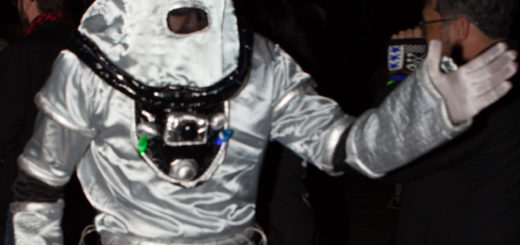All I want on the radio: cool tunes, quiet voices
 Radio waves are all around us. They penetrate into buildings and travel through car windshields. Unfortunately, if you turn on the radio, those radio waves often magically transform into yelling.
Radio waves are all around us. They penetrate into buildings and travel through car windshields. Unfortunately, if you turn on the radio, those radio waves often magically transform into yelling.
Much of the time, in an effort to keep things “exciting,” DJ’s speak in that dreadful “radio announcer voice,” interspersed with blaring commercials. Thanks to a childhood spent in the front rows of a terrifying old-school, fire-and-brimstone Southern Baptist Church, I have a strong aversion to men yelling at me.
All I ask for on the radio are buttery–voiced male DJ’s playing the latest indie pop. I want an announcer trying to seduce my ears into hanging around through the next commercial break. I don’t want to be yelled at anymore. I also want my pop music to be no older than the mustard in my refrigerator. Preferably as fresh and free-range as my eggs, but no older than my mustard.
Exactly what do I mean by indie pop? Rather than rattling off band names — many of whom will be playing the Austin City Limits music festival in September — let’s assume that if a tune has turned up on TV in “Grey’s Anatomy,” “Medium” or “Veronica Mars,” it’s likely indie pop.
Still confused? Let’s compare pop to publishing. At one end of the dial, KGSR plays the equivalent of serious, literary fiction, the type reviewed by The New York Times. In contrast, Britney Spears, et al., are the musical version of a tatty paperback romance, complete with a lurid cover and formulaic plot. I’m looking for a middle ground, perhaps the pop equivalent of Dan Brown’s book, “The Da Vinci Code.”
Alas, there isn’t often anything on Austin radio for me. Sweet-voiced Andy Langer’s fabulous new and local music show “The Next Big Thing” is only on 101X Sunday from 6 to 10 p.m. By the time the University of Texas student radio station KVRX comes on-air at 7 weeknights, I have dinner to make and TV shows to watch. I can’t listen to radio while cooking. If a song comes on by groups like the Moldy Peaches or Everclear, who knows what will end up in the soup?
Why should you care about how local radio isn’t meeting my needs? Isn’t that my problem? Well, actually, it is everyone’s problem. Radio frequencies are a finite natural resource, and we should all be concerned about how they are being used.
I was first introduced to the concept of radio frequencies being a limited natural resource by Robert Jensen, associate professor in the School of Journalism at UT-Austin. An offhand comment Jensen made about radio was my personal Eureka moment.
“We live in a society where the assumption is that everything is private,” Jensen said, explaining my revelation.
Part of what I find particularly troubling about this use of a finite natural resource is the casual aggression towards women endemic on today’s radio. This misogyny can be heard in popular songs, including Kanye West’s “Gold Digger” with lyrics describing women using men for their money. Even worse, I double-dog-dare you to flip around the Austin radio dial for an hour without hearing the unprintable term best describing a female canine.
Being frustrated by local radio, I’ve put some effort into finding outlets for my tastes, although nothing that works in my creaky car. One satisfying solution was DJ Ghosty on the Left of Center channel on the subscription-only Sirius Satellite Radio. With a voice like well-ripened Brie, Ghosty gave me what I wanted, sans commercials. Alas, this past week, Ghosty moved from Left of Center to another Sirius channel. This has caused me more distress than I thought possible.
Thank goodness for the Internet. There are zillions of international radio stations available online. You can listen to a station broadcasting live from Denmark, while lounging in Del Valle. Since reporting a story on SXSW for The Baltic Times, a newspaper based in the post-Soviet capital of Riga, Latvia, my ears have been lunching with a likable Latvian lad on their local pop station SWH. Buttery-voiced DJ Toms doesn’t yell at me.
But the best part of listing to international radio stations is knowing I’m unlikely to be supporting the Clear Channel monolith, headquartered just down the road in San Antonio. Clear Channel operates more than 1,200 stations in the United States — six here in Austin. In a glum sign for any music fan — or struggling singer-songwriter — Clear Channel prominently displays its stock ticker on its Web site. Like any corporation, Clear Channel is being run for the benefit of its stockholders, not its listeners. Earlier this month, it reported revenues of $1.5 billion for the first quarter of 2006.
It’s clear that corporate radio today isn’t using the natural resource of radio frequencies in the most beneficial way for me. And if my needs aren’t being met, chances are the needs of other people aren’t being met, either.
If you aren’t happy with the way radio frequencies are being used, tell the folks in Washington. Or just have your ears flee the country via the Internet. It won’t solve the underlying problem, but at least you’ll be entertained. And if you can’t get any satisfaction, you can escape limited local radio at www.radiolocator.com.






















